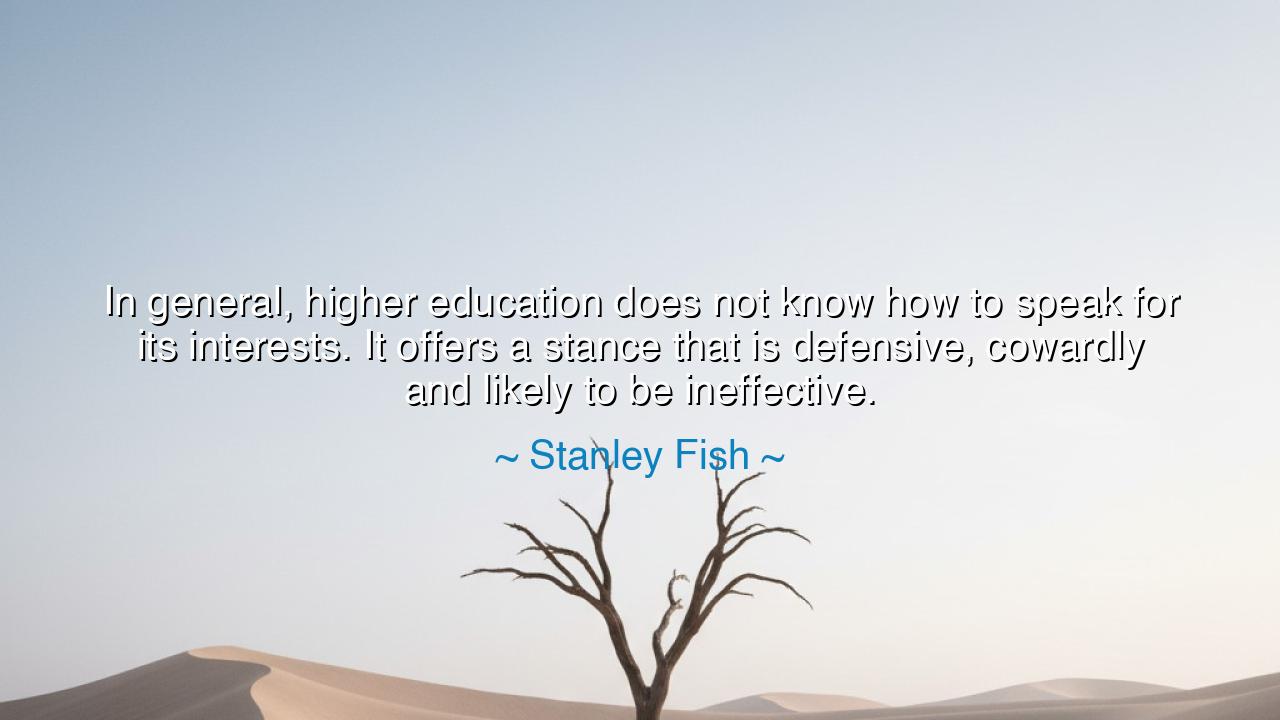
In general, higher education does not know how to speak for its
In general, higher education does not know how to speak for its interests. It offers a stance that is defensive, cowardly and likely to be ineffective.






Hear the words of Stanley Fish, sharp critic and unflinching observer of institutions, who declared: “In general, higher education does not know how to speak for its interests. It offers a stance that is defensive, cowardly and likely to be ineffective.” In this statement lies a truth as unsettling as it is urgent. For he speaks not of the weakness of knowledge itself, but of the frailty of the stewards of knowledge—those guardians of higher education who, when pressed, retreat into timid apologies rather than proclaiming boldly the worth of their mission.
The university, that ancient temple of learning, was once a place where the great voices of civilization thundered against ignorance. In Athens, it was Socrates who dared to question, Plato who built his Academy, Aristotle who shaped the very foundations of thought. In such days, education was not defensive—it was audacious, fearless, and transformative. Yet in the modern age, as Fish laments, the academy often hides when challenged, speaking not with conviction but with caution, as though ashamed of its own purpose. This is the cowardice he names: a retreat into jargon, bureaucracy, and timidity when clarity and courage are required.
History shows us the peril of such silence. In times of political upheaval, universities that failed to defend their independence often became tools of propaganda. In Germany during the 1930s, many professors, fearful of standing firm, bowed to authority rather than protecting the freedom of inquiry. Their defensiveness, their refusal to speak with courage, did not preserve them—it weakened them, until knowledge itself was bent into servitude. Compare this with those few who resisted, who dared to speak plainly and risk much; though many suffered, their voices endure as proof that truth requires boldness.
Fish’s words remind us that when higher education forgets how to defend itself, it betrays its own essence. For universities are not merely buildings or bureaucracies—they are living guardians of inquiry, debate, and discovery. If they speak weakly, they teach weakness. If they cower, they show the world that knowledge itself lacks confidence. And what society will defend a treasure that its own keepers present as fragile and uncertain? Thus, Fish warns, ineffectiveness is the fruit of timidity.
Yet his words are not only criticism—they are a challenge. They call upon the leaders of schools and universities to reclaim their voice, to speak with the strength that comes from knowing the worth of what they guard. For the pursuit of knowledge is not a luxury; it is the foundation of civilization, the wellspring of progress, the safeguard of freedom. If higher education cannot proclaim this truth with boldness, then who shall? The responsibility cannot be abandoned, for silence only invites erosion.
The lesson, then, is clear: knowledge must be defended with courage. Those who lead schools and universities must learn to speak not as beggars asking for pity, but as guardians declaring the necessity of wisdom. They must show society that education is not an ornament for the privileged, but a shield for all. And individuals, too, must remember that to learn is to claim a power that requires defense. To shrink back, to remain passive, is to let others dictate the value of learning.
Practical action flows from this wisdom: students, speak boldly of the worth of your studies. Teachers, proclaim with clarity the purpose of your work. Leaders of education, frame your message not as apology but as vision. And all who value truth must defend the institutions that preserve it. For if they fall silent, ignorance will speak louder, and its voice will carry ruin.
So remember always Fish’s warning: higher education that defends timidly will fail, but higher education that speaks with conviction will endure. Let the guardians of knowledge reclaim their courage, that the flame of learning may burn brightly, guiding humanity through the darkness of ignorance toward the dawn of wisdom.






AAdministratorAdministrator
Welcome, honored guests. Please leave a comment, we will respond soon